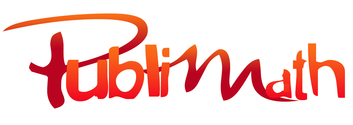History and epistemology in mathematics education: proceedings of the 5th European Summer University. Leonard and Thomas Digges: 16th Century Mathematical Practitioners. p. 669-678.
(Leonard et Thomas Digges : des mathématiciens "pratiques" du 16e siècle.)
Une version texte intégral est en téléchargement sur le site Bibliothèque numérique des IREM et de l’APMEP Télécharger
Auteur : Rogers Léo
Résumé
Dans l’Angleterre du XVIe siècle, Robert Recorde (1510-1558) et John Dee (1527-1609) proposaient des applications des mathématiques et mettaient en place un programme d’éducation publique. Ils défendaient l’idée que les mathématiques étaient utiles et que leur avancement contribuerait à la richesse de la nation. Dans ce but, Leonard Digges (vers 1520-1559), un ami proche de Dee, produisit des manuels pratiques pour les navigateurs, arpenteurs, propriétaires fonciers, menuisiers, menuisiers et maçons, leur montrant comment améliorer leur métier et introduire de nouvelles inventions instrumentales. Après la mort de Léonard, son fils Thomas (1546-1595) eut comme tuteur John Dee et reçut un enseignement mathématique avancé. Dee et Digges ont collaboré dans divers travaux mathématiques et astronomiques et apporté des contributions significatives aux mathématiques et à l’astronomie, étant responsables d’une version précoce du télescope. Thomas a favorisé les applications des mathématiques dans beaucoup de problèmes pratiques, militaires et économiques, comme responsable de l’organisation et administration de projets gouvernementaux. Leonard et Thomas Digges ont fait preuve d’ingéniosité dans leurs travaux mathématiques, inventé plusieurs nouveaux dispositifs, promu un plus large accès aux connaissances techniques et scientifiques en dehors des universités et ont été parmi les premiers à définir le rôle du mathématicien dans la société anglaise. Abstract In 16 th century England Robert Recorde (1510-1558) 1 and John Dee (1527-1609) were proponents of the applications of mathematics and set about a programme of public education. They claimed mathematics was useful and that advancement in the subject would contribute to the ‘common wealth’ of the nation. In this respect, Dee’s close friend Leonard Digges (c1520-1559) produced practical manuals for navigators, surveyors, landowners, joiners, carpenters and masons, showing them how to improve their craft and introducing new instrumental inventions. After Leonard died his son Thomas (1546-1595) was tutored by John Dee, and received advanced mathematical instruction.
Dee and Digges collaborated in various mathematical and astronomical works and made significant contributions to mathematics and astronomy, being responsible for an early version of the telescope.
Thomas furthered the applications of mathematics in many practical, military and economic problems, being responsible for the organisation and administration of government projects. Leonard and Thomas Digges displayed understanding and ingenuity in their mathematical works, invented many
new devices, promoted wider access to technical and scientific knowledge outside the universities, and were, through their works among the first to define the role of the ‘mathematical practitioner’ in English society.
Notes
Chapitre des Actes de la cinquième université d’été (ESU 5).
Données de publication
Éditeur Vydavatelsky Press Prague , 2008 Format 14,8 cm x 21 cm, p. 669-678 Index Bibliogr. p. 676-678.
ISBN 80-86843-19-X EAN 9788086843193
Public visé chercheur, enseignant, formateur
Type chapitre d’un ouvrage Langue anglais Support papier
Classification
